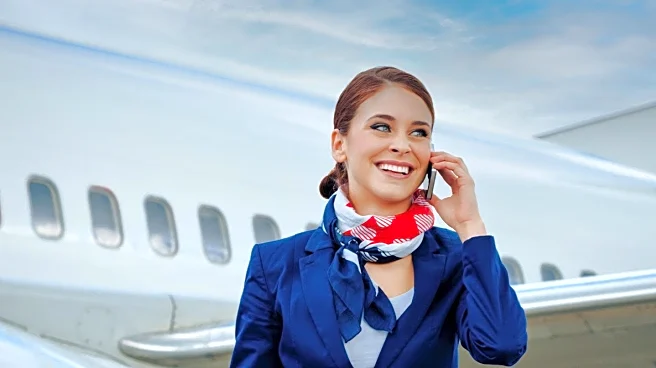What's Happening?
A recent incident involving a Malaysian passenger who complained about a stewardess not assisting with luggage has sparked discussions about the role and responsibilities of cabin crew. The passenger expressed dissatisfaction on social media, criticizing
the stewardess for not helping lift a bag, citing her age as a factor. This incident has drawn attention to the misconceptions some passengers have about the duties of flight attendants. Many online commentators have defended the stewardess, emphasizing that cabin crew are primarily trained for safety and emergency situations, not for handling passengers' luggage. The discussion highlights the demanding nature of the job, where attendants manage long hours and challenging passenger expectations while maintaining professionalism.
Why It's Important?
This incident underscores a broader issue within the airline industry regarding passenger expectations and the perceived role of cabin crew. The misunderstanding of flight attendants' responsibilities can lead to unrealistic demands and added stress for airline staff. This situation reflects a need for better public awareness about the primary duties of cabin crew, which focus on safety and emergency preparedness rather than personal service. The incident also highlights the evolving nature of air travel, where the glamor of past decades has shifted to a more utilitarian experience, potentially affecting passenger attitudes and expectations. Addressing these misconceptions is crucial for improving the working conditions of flight attendants and ensuring a respectful environment for both staff and passengers.
What's Next?
Airlines may need to consider implementing educational campaigns to inform passengers about the roles and responsibilities of cabin crew. Such initiatives could help manage expectations and reduce instances of conflict or dissatisfaction. Additionally, airlines might explore policy changes to clarify the extent of assistance that crew members can provide, ensuring that passengers understand the limitations of in-flight service. This could involve clearer communication during the booking process or through in-flight announcements. By addressing these issues proactively, airlines can enhance the travel experience and support their staff in maintaining a professional and respectful environment.
Beyond the Headlines
The incident also raises questions about ageism and respect in the workplace. The passenger's comment about the stewardess's age suggests underlying biases that can affect perceptions of capability and professionalism. This highlights the need for broader societal discussions about age diversity and respect in various professions, including the airline industry. Promoting inclusivity and challenging stereotypes can contribute to a more equitable and respectful work environment for all employees, regardless of age.

















